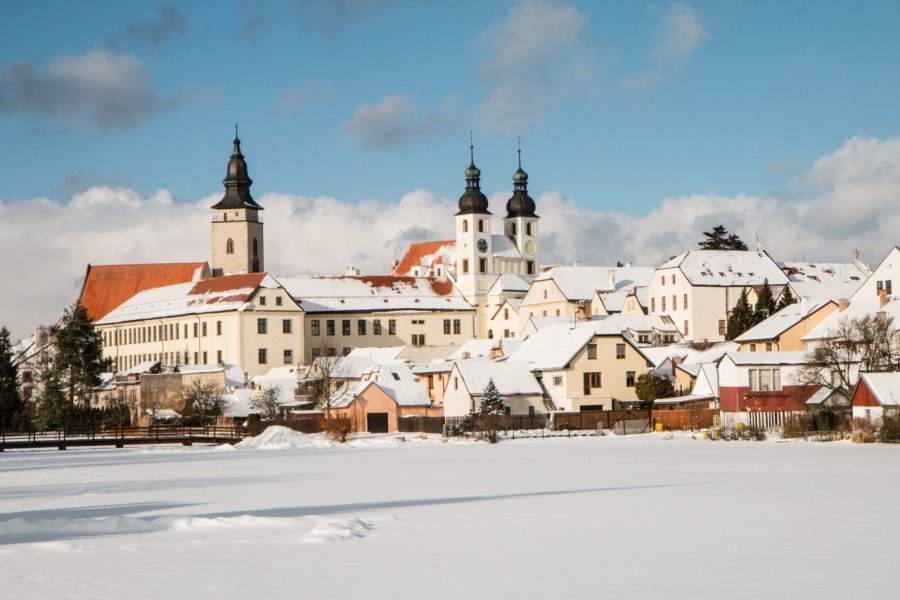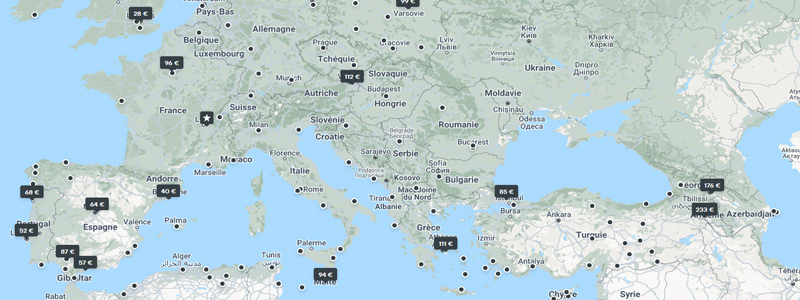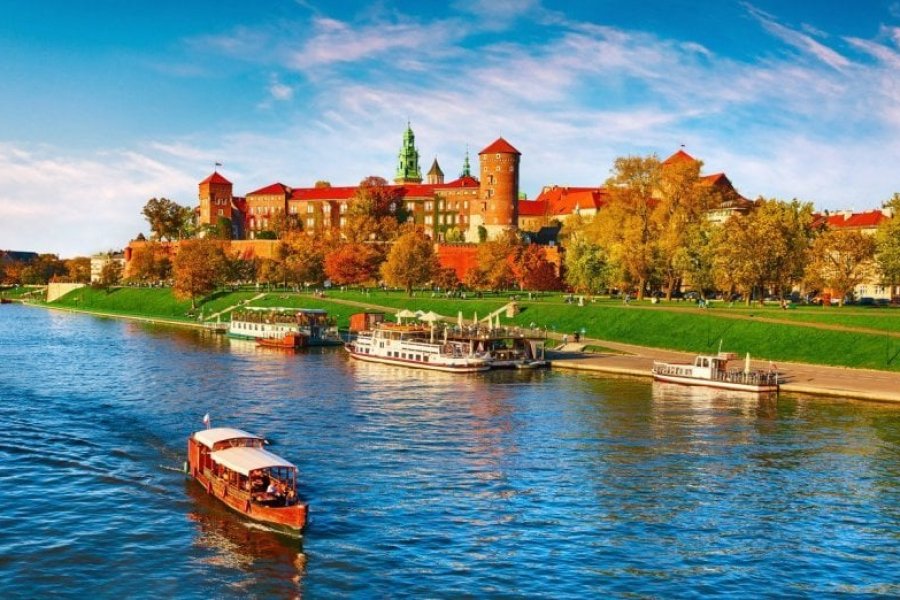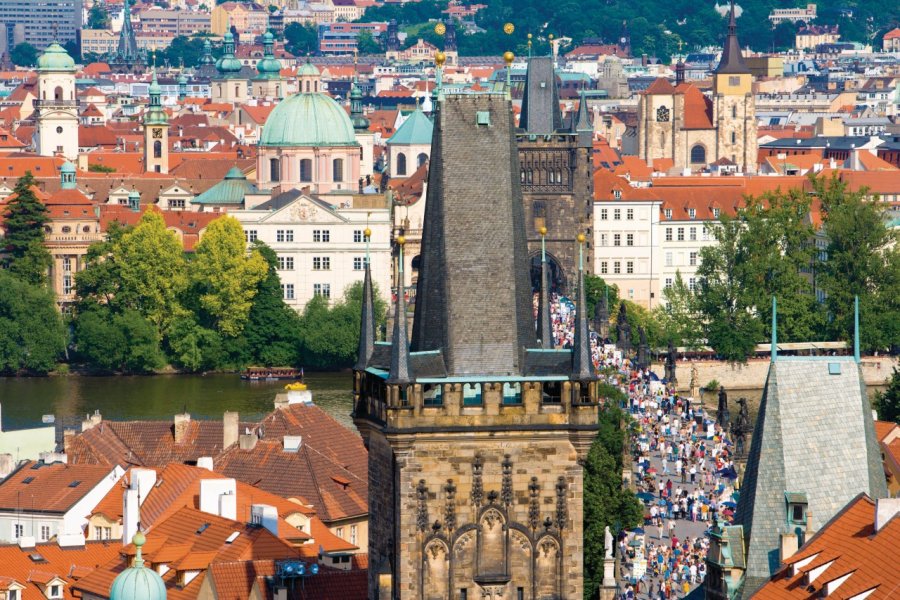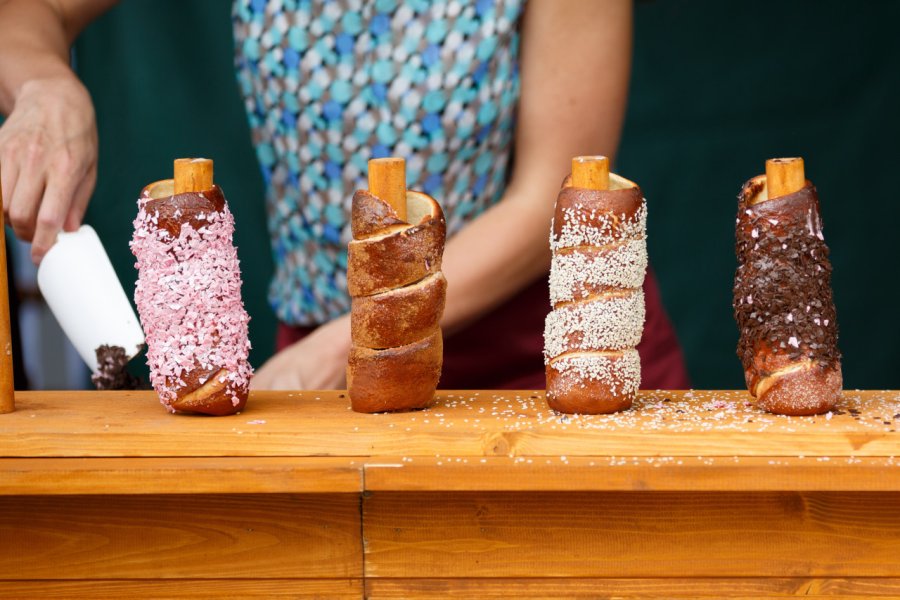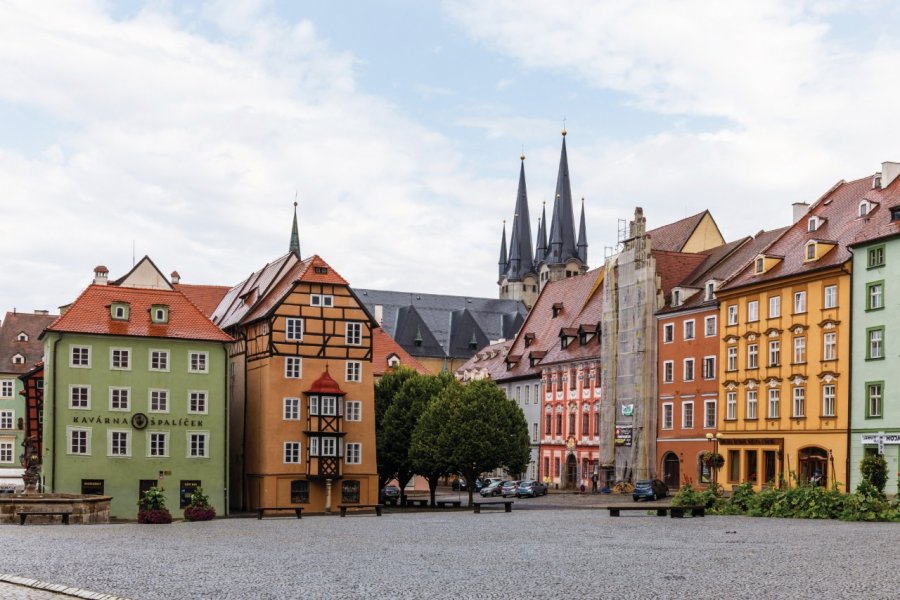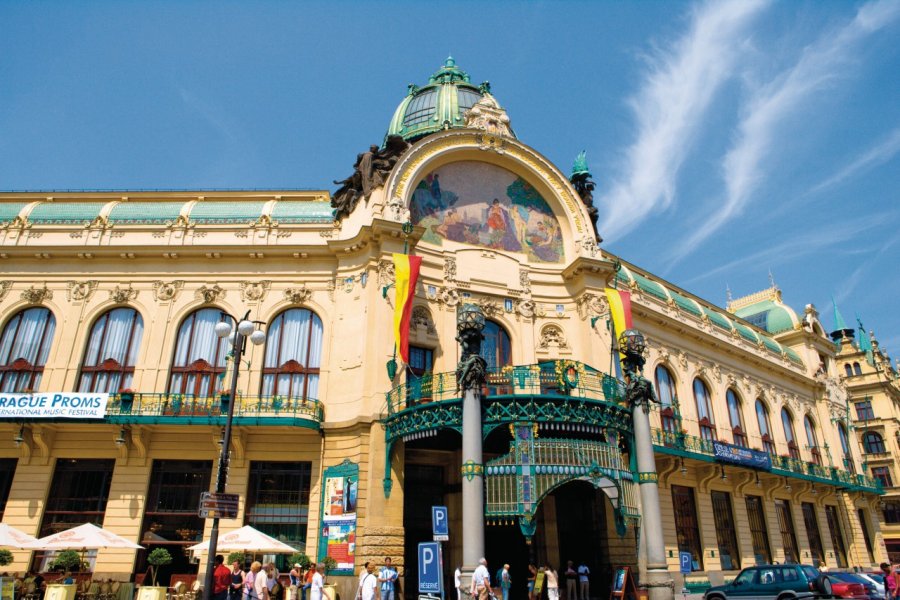Travel guide Czech Republic
The Czech Republic means Prague, of course! While the Czech capital and its old pedestrian center, the medieval capital of magic, enjoys a good reputation among fans of historical heritage and couples on a romantic getaway, as well as friends on the go, this is not necessarily the case in the rest of the country. And this is what the Czech Republic travel guide intends to rectify! Moving away from the capital, one quickly realizes that traditions and folklore punctuate the life of Czechs, in a scenery that is very different from one region to another, garnished with more than 2,000 castles: from dense forests to the peaks of Liberec, from the plateaus of Český ráj to the ponds of Třeboň... And what about Bohemia, home to the imperial Karlovy Vary and its splendid colonnades. In the south of the country, there is the beautiful Český Krumlov and the colorful squares of Loket, Telč and Třebíč. There are countless activities in the Czech Republic: swimming in the high lakes, walking or biking in the forest or among the vineyards, skiing in the cooler season, gastronomy. Yes, you can eat and drink as well as party in this corner of Central Europe, toasting with one of the best beers in the world! Vítejte v České republice! Welcome to the Czech Republic!
What to see, what to do Czech Republic?
-
Book an activity
-
Customized travel
- The most beautiful cities Czech Republic
When to go Czech Republic ?
When to go to the Czech Republic? The peak tourist season is from the end of May to the end of September. Prices are high during this time, especially on long weekends. The best time to travel to the Czech Republic is therefore in April-May or September-October to avoid the crowds, the summer heat and the cold, dry winter climate. Certain periods, such as early spring and late autumn, should be avoided, as the cities seem sadder in the wind and rain. You should also be aware that many castles are closed during the winter months or open only for a few hours on weekends for groups. Christmas and New Year's Eve week is very popular with tourists, so remember to book your hotel well in advance. So when to go to the Czech Republic? The best months are April, May, September and October.
Suggested addresses Czech Republic
Travel Czech Republic
-
Find a hotel
-
Car Rental
-
International e-SIM package
-
Find a local agency
Le réseau routier et le réseau ferré sont denses et bien entretenus en République Tchèque, de sorte qu'il ne vous sera pas très difficile d'établir votre propre circuit en fonction de vos préférences et des étapes que vous envisagez de faire lors de votre visite du pays. Voici pour vous aider quelques suggestions d'itinéraires permettant de découvrir l'essentiel du pays si vous n'avez que peu de temps, ou d'autres plus exhaustifs si vous avez décidé de prendre votre temps. Dans tous les cas, il vous sera très facile surplace d'adapter et modifier ces circuits selon votre inspiration. Si le nombre limité d'aéroports ne permet pas de faire un séjour express aux quatre coins du pays, les distances ne sont jamais très longues et trois semaines suffisent largement pour faire un tour complet. Rester plus longtemps sera l'occasion d'ajouter une pause, une randonnée ou autre activité sportive ou de sortir un peu des sentiers battus.
Find unique Stay Offers with our Partners
How to go Czech Republic
How to go alone
The average price of a flight from Western Europe to Prague in the high season (but also at Easter, during the end of the year, in May and June) from 100 to 345 €, and in low season from 80 to 180 €. Please note that the price variation depends on the company used and, above all, on the reservation deadline. To get good rates, it is essential to book well in advance. For accommodation, the same philosophy: anticipate!
How to go on a tour
There is no problem to go on an organized trip to Prague. The city of a hundred spires is on all tour operators' catalogs, at all times of the year, and for all price ranges. The same goes for visiting the rest of the country. If you don't have much time, it can be quite smart to concentrate your visit on one or a few selected regions of the Czech Republic.
How to get around
Getting around the city is very easy in the Czech Republic, where the years of communist rule and the healthy new economy have resulted in dense, efficient, very cheap and easily understood networks for tourists. This is especially true in Prague, which has a modern, clean and fast metro. To get around the country, the train is more pleasant than the bus, but it is often late and serves fewer cities. By car, the highways are very good unlike other roads. As for the plane, it is of little use to cross the country.
Featured articles Czech Republic
Discover Czech Republic
Although Prague is now a major tourist destination, the rest of the country is still little known to foreign tourists. It is true that Czechs travel through their beautiful regions on foot, by bicycle or by car, accompanied by a few Germans or Austrians who come as neighbors. But this is a far cry from the heavy crowds on the Spanish coast or in Venice at the height of the tourist season. However, the Czech Republic is full of places of interest and it is impossible to visit them all in a few days or weeks. Nevertheless, the distances are relatively short and the transportation is efficient. In a week or two, you can get a good overview of the country. Although Prague has become an expensive city, the provinces have not been affected by the inflation of mass tourism; once you are out of the capital, you will realize that the daily budget is far from being too high compared to the treasures to be discovered!
Pictures and images Czech Republic
The 15 keywords Czech Republic
1. Beer
In the Czech Republic, beer is sacred. It is the national pride. It must be said that the quality of the barley gives Czech beer that special, attractive taste that makes you want to have more. Among the best known are Budsvar (Budweiser) and Pilsen Urquell (Pilsener). Every village has its own pivnice (tavern) and the Czechs are all great beer lovers: the average consumption is estimated at one bottle per day per inhabitant. @font-face {font-family: "Cambria Math"; panose-1:2 4 5 3 5 4 6 3 2 4; mso-font-charset:0; mso-generic-font-family:roman; mso-font-pitch:variable; mso-font-signature:3 0 0 0 1 0;}p.MsoNormal, li.MsoNormal, div.MsoNormal {mso-style-unhide:no; mso-style-qformat:yes; mso-style-parent:""; margin:0cm; mso-pagination:widow-orphan; font-size:10.0pt; font-family: "Arial",sans-serif; mso-fareast-font-family:Arial;}.MsoChpDefault {mso-style-type:export-only; mso-default-props:yes; font-size:10.0pt; mso-ansi-font-size:10.0pt; mso-bidi-font-size:10.0pt; font-family: "Arial",sans-serif; mso-ascii-font-family:Arial; mso-fareast-font-family:Arial; mso-hansi-font-family:Arial; mso-bidi-font-family:Arial;}div.WordSection1 {page:WordSection1;}
1.
In the Czech Republic, beer is sacred. It is the national pride. It must be said that the quality of the barley gives Czech beer that special, attractive taste that makes you want to have more. Among the best known are Budsvar (Budweiser) and Pilsen Urquell (Pilsener). Every village has its own pivnice (tavern) and the Czechs are all great beer lovers: the average consumption is estimated at one bottle per day and per @font-face {font-family: "Cambria Math"; panose-1:2 4 5 3 5 4 6 3 2 4; mso-font-charset:0; mso-generic-font-family:roman; mso-font-pitch:variable; mso-font-signature:3 0 0 0 1 0;}p.MsoNormal, li.MsoNormal, div.MsoNormal {mso-style-unhide:no; mso-style-qformat:yes; mso-style-parent:""; margin:0cm; mso-pagination:widow-orphan; font-size:10.0pt; font-family: "Arial",sans-serif; mso-fareast-font-family:Arial;}.MsoChpDefault {mso-style-type:export-only; mso-default-props:yes; font-size:10.0pt; mso-ansi-font-size:10.0pt; mso-bidi-font-size:10.0pt; font-family: "Arial",sans-serif; mso-ascii-font-family:Arial; mso-fareast-font-family:Arial; mso-hansi-font-family:Arial; mso-bidi-font-family:Arial;}div.WordSection1 {page:WordSection1;}
1.
In the Czech Republic, beer is sacred. It is the national pride. It must be said that the quality of the barley gives Czech beer that special, appealing taste that makes you want to have more. Among the best known are Budvar (Budweiser) and Pilsner Urquell (Pilsener). Every village has its own pivnice (tavern) and the Czechs are all great beer lovers: the average consumption is estimated at one bottle per day per inhabitant.
1. #Beer
In the Czech Republic, beer is a national pride. It must be said that the quality of the barley is exceptional. Among the best known are Budvar and Pilsner Urquell. Every village has its own pivnice (tavern) and the country has hundreds of microbreweries. Often they serve you a pint before bringing you the menu.
2. #Bohemia
This term seen and heard everywhere especially evokes the historical region of Europe that covers the western half of the present Czech Republic. In Czech, it is said Čechy, a root very similar to the word Český meaning Czech. Bohemia is indeed the origin of the country we know today, known for its ancient kingdom, forests and crystal
3. #Castles
Few countries have such a vivid medieval heritage as the Czech Republic. The southern landscape is dotted with numerous castles and chateaus. According to some sources, there are more than 2,000 of them. The most beautiful of these are undoubtedly the fortresses of Karlštejn and Pernštejn, the most curious being Lednice Castle
4. #Dlažební Kostky

The cobblestones as far as the eye can see are the hallmark of the capital. Pragians call them Kočičĕhlavy (cat heads). It's true that it looks nice, but in winter they are cursed: with a light morning frost, it's an ice rink! Stiletto heels are a no-no if you haven't come to Prague to spend the day at the cobbler's
5. #Grenat

Who has never heard of Bohemian garnet? The geological wealth of the country has allowed the development of an economy based on the production of jewelry that continues to this day. Bohemian garnet is a semi-precious stone of burgundy red color that can be found everywhere at affordable prices. Beware of tourist traps!
6. #Ice hockey
More than a sport, ice hockey is a national religion and its great stars Jaromir Jagr and Dominik Hašek are idolized. In Prague, people thrill to the World Championships, which the Czech Republic has not won since 2010, and cultivate a visceral sporting contempt against Canada and Russia, their eternal rivals on the ice
7. #Knedlíky

Made from bread, water and flour, knedlík is the basis of Czech culinary art. Popular throughout Central Europe, its original recipe is attributed to Prague kitchens. It is the favorite topping of Czechs and accompanies all the most typical dishes
8. #Krtek
The most popular character in the history of Czech cartoons. "Molek," in French, was born in the early 1950s from the imagination of illustrator Zdeněk Miler. So endearing, this little mole, who walks awkwardly on two legs, had many adventures and marked several generations of Czechs until 2002
9. #Puppets

An important part of popular culture, puppets have been used since the Renaissance to educate children. Some of them, like the mythical Hurvínek, are the symbol of the first television programs for children. They have also often been used to "educate" adults, offering political and social caricatures
10. #Opera
A favorite mode of expression for the great minds of the 19th and 20th centuries, it brings together legends, myths and political messages. The greatest Czech opera composer is undoubtedly Bedřich Smetana, often considered the "Bohemian Verdi" thanks to his traditional, allegorical and patriotic creations. To be heard in Prague or Brno.
11. #Škoda
The ambition of many Czechs was to own one: a Škoda (or Škodovka to the friends). Despite the takeover of the brand by Volkswagen, the Škoda remains dear to the hearts of the population. The city of Mlada Boleslav has long been a vibrant place for the carmaker; the former central factory, now a museum, is located 40 km from Prague
12. #Švejk
The symbol of the Czech mentality in all its facets and clichés: quiet, ironic, political, sometimes lazy, bon vivant. A literary creation of Jaroslav Hašek, who in his novel Dobrý voják Švejk ( Brave Soldier Chvéïk ) describes the adventures of a sergeant, drinker and impostor before and during the First World War
You are from here, if...
Instead of putting your jacket on the back of your chair in a restaurant, you leave it in the coat check or hang it on the pegs.
You leave a real tip for waiters in bars and restaurants
You take off your shoes before entering a house and keep your shoes off inside, even in small B&Bs.
You don't get offended if strangers sit next to you in Czech taverns when it's busy, it's very common to share your table.
You offer flowers or chocolates to the hostess when you are invited.
You forgo wine for beer, and you don't order "another beer please". You simply wait for the waiter to bring you a full pint
French chivalry shouldn't make this last point very difficult for you: give up your seat to the elderly on public transport

